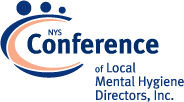NYS Conference of Local Mental Hygiene Directors, Inc. | An Affiliate of the New York State Association of Counties >
Hot Topics / Priority Issues
Medicaid HCBS: New Briefs Provide the Latest Enrollment, Spending, and State Policy Trends
KFF has released two new issue briefs highlighting the latest enrollment and spending data on Medicaid’s home and community-based services (HCBS), drawing on findings from KFF’s 18th annual 50-state survey of Medicaid HCBS programs.
The survey finds that 2.5 million people received Medicaid home and community-based services under waivers and 2.3 million through required or optional services under states’ standard program benefits, at a total cost of $92 billion to states and the federal government. Within that, 780,000 people with intellectual and developmental disabilities and 960,000 seniors and people with physical disabilities received such services through 1915(c) HCBS waivers, one of the primary ways states can extend HCBS eligibility to people who would otherwise qualify for institutional care, the survey found.
Medicaid continues to be the nation’s largest payer for long-term care, spending $197 billion on such care in fiscal year 2018. More than half of such spending went to HCBS rather than institutional care, reflecting an ongoing effort by states to shift such care away from more expensive institutional settings. Six percent of HCBS spending is mandatory for all states under Medicaid, while the remaining 94 percent is optional and could potentially be affected by an economic downturn, or policy changes such as a block grant or per capita cap.
The briefs, available at the links below, contain data about per-enrollee spending on HCBS by target population, HCBS waiver waiting lists, and a discussion of state policy trends, such as implementation of electronic visit verification and value based payment models. The data and analysis in the briefs can also help inform understanding of the long-term care components of Medicare-for-All proposals.



